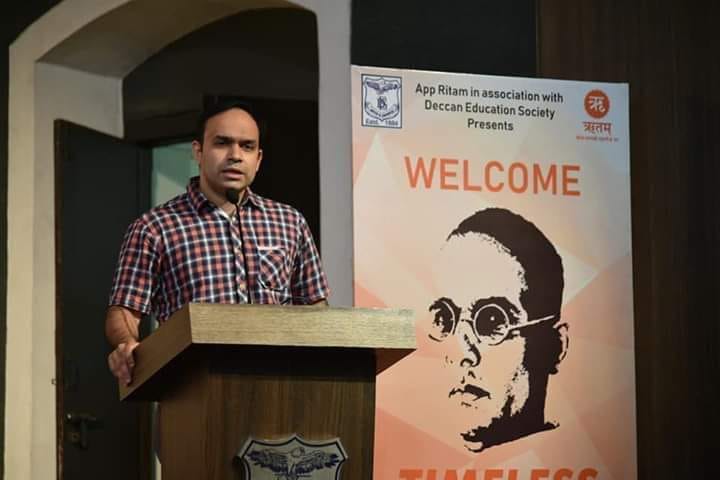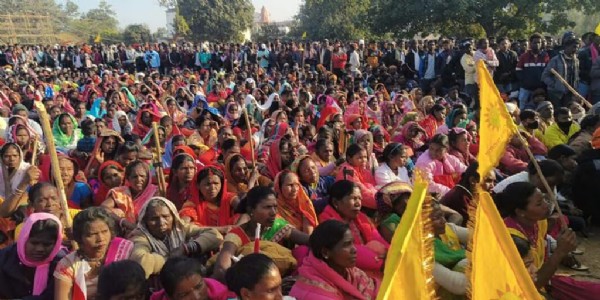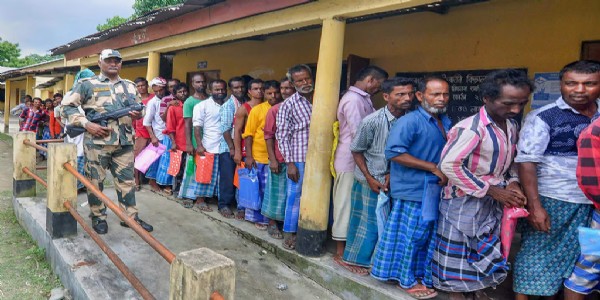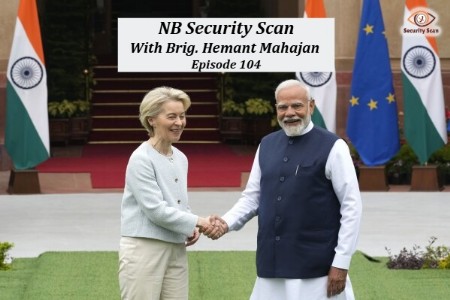Veer Savarkar navigating India's Defense Policy amidst Chinese Aggression
In 1954, Savarkar was demanding the modernization of the armed forces of India.
Total Views | 231
On the recent background of conflict between India and China, let’s peep into history to know Veer Savarkar’s views on Chinese aggression.
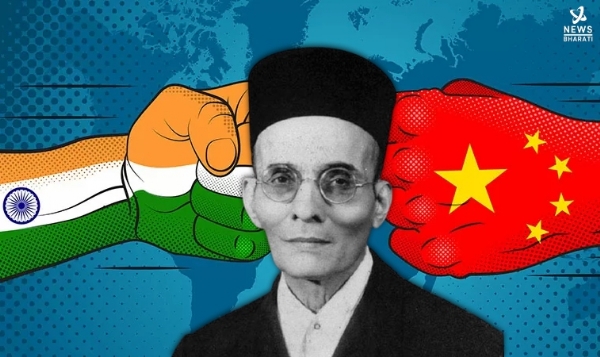
Savarkar was a well-attentive and close watcher of happenings in the world from his young days. Even the Indian revolutionaries of Abhinav Bharat (revolutionary organization founded by Savarkar himself) were in touch with the revolutionary forces of Russia, Ireland, Egypt and China. His famous book “The Indian War of Independence-1857” proscribed by British Authorities in India even before its publication, however he managed to get it published secretly and copies of book were sent to India, America, Japan and China wrapped in artistic covers printed with innocuous and bogus names such as ‘The Posthumous Papers of the Pickwick Club’, ‘Scott’s Works’ and ‘Don Quixote’. He inquired about developments of the Republic of China in his first letter sent from Andman’s Cellular Jail, dated December 15, 1912, to his younger brother Narayanrao. Veer Savarkar also greeted President of the Chinese Republic, Generalissimo Chiang Kai Shek when he paid a meteoric visit to India on February 11, 1942. In reply the Chinese leader and his wife thanked Savarkar for the good wishes. Savarkar was aware of developments and history, revolution, freedom movement and independence of China.
Ever since the Communist Party of China (CPC) came to power in the People's Republic of China (PRC), its leaders have decided to occupy Tibet. While India’s Prime Minister Jawaharlal Nehru was explaining in the Indian Parliament the difference between suzerainty and sovereignty (Nehru, Jawaharlal. India's Foreign Policy, The Publication Division- Ministry of Information & Broadcasting, Government of India, 1961, Page 302), the Chinese armies marched into Tibet in 1950. Nehru made Panchsheel, or the Five Principles of Peaceful Co-existence agreement with China which was signed on April 29, 1954.
The representative of the Kesari newspaper of Pune requested Savarkar to write an article on India’s defense and strategic policy which was published on January 26, 1954.
Savarkar writes: “When China, without even consulting India, invaded the buffer state of Tibet, India should at once have protested and demanded the fulfillment of rights and privileges as per her agreements and pacts entered into with Tibet. But our Indian Government was not able to do any such thing. We closed our eyes in the name of world peace and co-existence and did not even raise a finger against this invasion of Tibet. Neither did we help this buffer state of Tibet when her very existence was at stake. Why? The only reason that I visualize is our unpreparedness for such an eventuality and/or war..……That is the reason why after swallowing the whole of Tibet the strong armies of China and Russia are now standing right on our borders in a state of complete preparedness and on the strength of the above, China is today openly playing the game of liquidating the remaining buffer states of Nepal and Bhutan.……We have not been able to put before her an army which can match the strength of her armies on these borders of ours even today. This is precisely the reason why China dares come forward with such an unabashed claim on our territories.”
Savarkar criticizes the policy of Panchsheel because India has made this agreement with China when Tibet had been already completely digested by Mao. Savarkar always advocated militarization policy and expounded its importance, utility and necessity and here in this article, he was drawing attention towards India’s lack of defense policy and unpreparedness which proved him right when China invaded India in 1962. Here Savarkar was also stating the importance of Tibet, Nepal and Bhutan for India as buffer states. Buffer state is a usually small neutral country lying between two larger rival countries and serving to prevent the outbreak of regional conflict.
Strategic and diplomatic expert Savarkar continues:
“ "China…. had completely overrun Tibet and destroyed the only buffer state so as to strengthen her vast borders. By this act of hers, China had with one stroke come right on our borders by force and prepared the way for an open aggression against India whenever she felt like it.” ”
It turned out to be true because the Chinese frontier advanced all across that territory by about thousands of kilometers towards the Himalaya by occupying Tibet, so the Indian border became vulnerable.
Savarkar continues: “Britain, when she was ruling over India, had by careful planning, pacts, treaties and agreements created a chain of buffer states like Tibet, Nepal and Bhutan in order to strengthen the borders of India and to safeguard it from China and Russia. Afghanistan also acted like a buffer state on the other side. Britain had on behalf of the Government of India, directly or indirectly taken upon herself by various pacts, charters and agreements even the guarantee of continued existence of these buffer states. Immediately on attainment of independence all these rights were transferred to the independent sovereign Republic of India.” (Keer, Dhananjay. Veer Savarkar, Popular Publication, 2nd edition, 1966, page 487-488)
Savarkar wants to state that Britain, who were ruling over us till 1947, were aware of importance of buffer state, therefore they maintained and preserved status of Tibet, Nepal and Bhutan as buffer state, but our government of independent India were completely ignorant and inattentive towards this and were under influence of dreamy principle of Panchsheel.
Savarkar has given an example of Jewish nation ‘Israel’ which came into existence in May 1948 after a period of almost two thousand years. Savarkar said: “[Israel] is besieged by their staunch enemies Arab nations. But this tiny nation has given military education to its men and women, procured weapons from Britain-US, established arm factories in their own nation, played treaties-pacts conspiracy games with foreign nations and raised its own strategic power to that extend that their enemy nations i.e. Arab nations couldn’t dare to invade them.” (Kesari, January 26, 1954)
Also read: Veer Savarkar- Champion of Democracy
Savarkar was saying that a nation which came into existence just nine months after India’s independence and which is very small compared to India, has increased their strategic and military power but India completely disregards and neglects these security things.
Further Savarkar said, it's not too late yet, so we need to increase our strategic and military strength as soon as possible to improve and correct our mistakes. (Kesari, January 26, 1954) India should be always vigilant about our neighboring countries.
Nehru welcomed Chou En-lai, Prime Minister of China, at Delhi on June 26, 1954 and given slogan ‘Hindi-Chini bhai bhai’ (Indians and Chinese were brethren).
Kesari newspaper of Pune asked Savarkar to give his opinion on this pact which was published on 4 July 1954.
Savarkar said;
”In politics the enemy of our enemy is our best friend. Enlightened self-interest is the only touchstone on which friendship in political dealings could be tested, since there is no such thing as real and selfless friendship in the political arena. If the meeting between Chou En-lai and Nehru, he said, angered the U.S.A., Indians should not mind it as the U.S.A. did not care to pause and think that India would -be dissatisfied or would feel insulted if America entered into a military pact with Pakistan. All the policies of India must be dependent on what was good or bad for India herself. If it was advantageous to India she should not in the least worry or care whether anyone felt enraged, insulted or irritated.”
Here Savarkar clearly welcomed the Nehru and Chou En-lai meeting and said that India should not care if any nation like USA gets inflamed due this meeting. India should look after her own interest only and this is the naked truth in International politics.
When asked about the outcome of the visit of Chou En-lai, Savarkar said: “The general principles that are being propagated as fundamental in this visit are very good and sound, so far as their language is concerned. Nothing is lost in proclaiming wishes for world peace, prosperity and brotherhood. But so long as India does not have any effective practical remedy or measures to check the transgressions, such visits have no more than a formal status.”
Savarkar states that,”while crying from the house-top about these principles it was worth noting that China, by swallowing Tibet, had ruthlessly trampled those very principles of world peace, brotherhood and peaceful co-existence. That was the funniest part of the whole deal, and it at once raised doubts in the Indian mind about the bona fides of China and Chou En-lai. There was at that time a political party in Tibet aiming at independence. It was curious and in a way most astonishing that after preying on and swallowing the mouse of Tibet the Chinese cat was talking of going on pilgrimage. That was exactly the role that the Chinese Premier Chou En-lai and President Mao Tse-tung were playing.” (Keer, Dhananjay. Veer Savarkar, Popular Publication, 2nd edition, 1966, page 489-490)
Savarkar was a rare combination of a poet’s heart and a rational intellectual in a single man. While welcoming the Nehru and Chou En-lai meeting, he is pointing towards China’s tactics of swallowing Tibet which posed a threat to India. As Savarkar is always saying that in international politics and diplomacy, borders can’t be demarcated by principles but by sword itself only. So principles have significance only if they are backed by military strength or power. India should not blindly rely on anybody and shouldn’t be careless. No country will help you without their own interest so always be watchful, vigilant and well prepared and this should be our principles in foreign policy.
Savarkar continues in same interview Kesari, 4 July 1954:
“China, Russia, Britain or even the recently established Pakistan all are talking of high-sounding principles, but they do so as a step towards diplomatic measures to achieve their own ends, and for the success of their own political objectives. In the present state of human relationship it should be just so; but of all the countries India alone has for long been in the habit of preaching sermons of high principles to others and unilaterally bringing them into practice, which ultimately proves disastrous to the interests of India. I only hope that this does not happen in this case of five principles, Panchsheel that are said to have been enunciated."
Savarkar is stating a naked truth that preaching sermons of high principles is a very good thing on moral ground but practically if we alone follow it and other nations only orally preaching it but it never reflects in their actions, then it may prove disastrous to the interests of India. So Savarkar was hoping that this should not happen in the case of Panchsheel but no one paid attention towards Savarkar’s warnings of 1954 and betrayal of 1962. It proves that covert enemy is more dangerous and harmful than explicit enemy. In 1965 war, we were well-prepared and we won that war against Pakistan whom we consider as our open enemy but lost against covert enemy i.e. China in 1962 war due to a mirage of high principles of Panchsheel and slogans like ‘Hindi-Chini bhai bhai’ and lack of military preparedness.
“What I feel is that if at all China uses India as a springboard or a handle to push forward her own territorial aims and interests, India should also primarily safeguard her own interests and if these moves do not go against her interests then alone take part in it. So long as China is looking to her interests alone, India should also follow the same footsteps and use the good wishes of China only in so far as they help to push the interest of India forward. We should believe in their good faith and good intentions as much as and as long as they believe in ours."
Savarkar was saying that, instead of China, we should use China for our own interests.
“One fact must be made dear here and it is that the U.K., U.S.A., U.S.S.R. and China can force India to bring into practice all these principles because they hold the upper hand, being in possession of atomic and nuclear weapons of warfare. But can India do the same? Can India force these nations to see that they follow the principles that they profess to preach? This is the most important question. It is no use having political or diplomatic fellow-feeling or friendship with either China or Russia on this basis. We must immediately undertake to see that military potential and preparedness of the Indian armed forces with modern and most up-to-date weapons of warfare is not being neglected and that we too can produce atomic and nuclear weapons just as these nations can. If China can erect plants and factories for the manufacture of atomic weapons of warfare in Sinkiang and other places we should also be able to do so. There is nothing difficult in it. Our scientists and laboratories might be able to invent and manufacture such weapons in a year or two or they might invent even more destructive ones…..But so long our weak and impotent Government at the Centre does not take even one step to achieve these objectives it is no use talking of high principles and running after the mirage of world peace, peaceful co-existence, world brotherhood and prosperity, and nothing good can come out of such so- called good-will visits. High principles must have sound armed strength behind them to see that they are brought into practice by those who talk eloquently about it. Taking all these things into consideration I feel that the time has come now when the Central Government must immediately take steps to increase the armed might and the military potential of India.” (Keer, Dhananjay. Veer Savarkar, Popular Publication, 2nd edition, 1966, page 490-491)
In 1954, Savarkar was demanding the modernization of the armed forces of India. We must develop atomic and nuclear bombs, adopt advanced technology and use modern warfare to hold the upper hand in Superpowers, but not to become Superpower, but to become India an idol of high principles. We must build our nation on high principles but we must be up-to-date in all fields to protect those high principles. As Savarkar said, ‘High principles must have sound armed strength behind them to see that they are brought into practice by those who talk eloquently about it.’
During the recent conflict between India and China, We were well prepared, vigilant and equipped with advanced arms and weapons, modern warfare and almost all Superpowers in favor of us due to our impressive foreign diplomacy. So indirectly we followed and implemented what Savarkar told in 1954. It proves Savarkar’s greatness and foresight.
--
Bharati Web


